The Case for User-Owned AI

The burgeoning field of Artificial Intelligence (AI) presents both immense opportunities and novel challenges, particularly regarding control and autonomy. A key question emerging is whether individuals should self-custody their AI agents, mirroring the self-custody principle prevalent in the Bitcoin community. This concept, highlighted by David Minarsch, suggests that entrusting important tasks to 'rental' AI agents may not be the most prudent approach.
The Self-Custody Analogy
In the cryptocurrency world, self-custody refers to individuals holding the private keys to their digital assets, thereby maintaining full control over their funds. Applying this concept to AI means users would have direct control over their AI agents, their data, and their decision-making processes, rather than relying on third-party providers.
Unified AI Stacks and the End of Fragmented Automation
As AI adoption grows, businesses are increasingly seeking unified AI strategies to reduce complexity and boost efficiency. Fragmented automation can lead to costly pitfalls, making a cohesive approach essential. Unified AI stacks promise a more streamlined and integrated AI experience, which could potentially empower users with greater control over their AI interactions.
The Mental Health Aspect of Movement
Interestingly, the role of movement in mental health is also gaining recognition. Physical activity is being explored as a potential 'polypill' cure-all for mental well-being. This underscores the importance of holistic approaches to technology and well-being, suggesting that AI should be developed and used in ways that promote, rather than detract from, mental and physical health.
Elon Musk's Controversial Decisions and Tesla
The leadership decisions of Elon Musk, particularly those concerning Tesla, continue to spark debate. Controversial choices can have significant repercussions, highlighting the need for careful consideration when implementing new technologies or strategies, whether in the realm of AI or electric vehicles.
Quantum Computing and Encryption
The ongoing development of quantum computing poses potential threats to existing encryption methods, including those that secure Bitcoin. Bounties are being offered to test the resilience of blockchain encryption against quantum attacks, reflecting the constant need for innovation and security in the digital age.
Bitcoin Mining in the U.S. and Tariffs
Bitcoin miners in the U.S. are facing new challenges, including potential tariffs that could significantly impact their operations. This illustrates the complex interplay between technology, economics, and geopolitics, emphasizing the need for adaptable strategies in the face of evolving circumstances.
Ethereum's Market Dynamics
Ethereum traders are closely monitoring key levels as whale accumulation slows and leverage rises. The burn rate of Ethereum has also dropped, signaling potential shifts in market dynamics. These factors highlight the volatile nature of cryptocurrency markets and the importance of staying informed.










